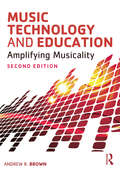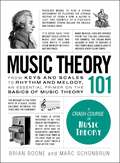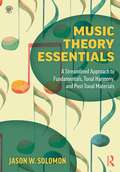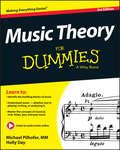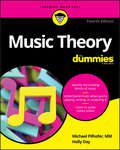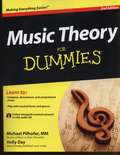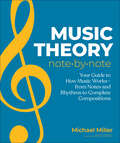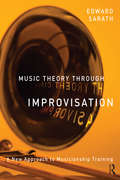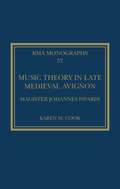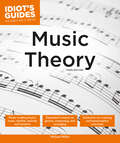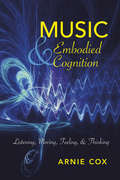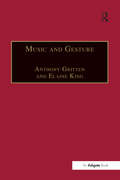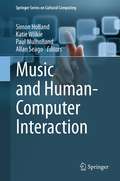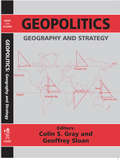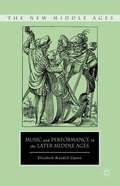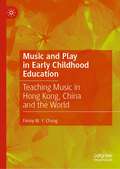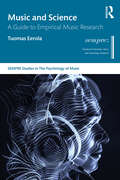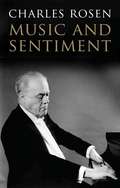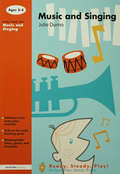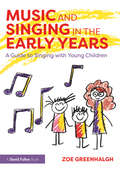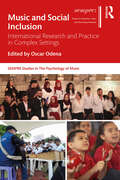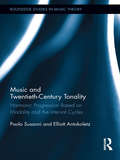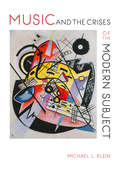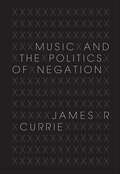- Table View
- List View
Music Technology and Education: Amplifying Musicality
by Andrew BrownMusic Technology in Education lays out the principles of music technology and how they can be used to enhance musical teaching and learning in primary and secondary education. Previously published as Computers in Music Education, this second edition has been streamlined to focus on the needs of today’s music education student. It has been completely updated to reflect mobile technologies, social networks, rich media environments, and other technological advances. Topics include: Basic audio concepts and recording techniques Enhanced music instruction with interactive systems, web-based media platforms, social networking, and musicianship software Administration and management of technology resources Distance education and flexible learning Music Technology in Education provides a strong theoretical and philosophical framework for examining the use of technology in music education while outlining the tools and techniques for implementation in the classroom. Reflective Questions, Teaching Tips, and Suggested Tasks link technology with effective teaching practice. The companion website provides resources for deeper investigation into the topics covered in each chapter, and includes an annotated bibliography, website links, tutorials, and model projects.
Music Theory 101: From keys and scales to rhythm and melody, an essential primer on the basics of music theory (Adams 101 Series)
by Marc Schonbrun Brian BooneLearn the basics of music theory in this comprehensive and easy-to-understand guide.From classical to hard rock, and jazz to hip hop, music is constantly evolving, but many of the basics have stayed the same. Understanding these basics is key to becoming a successful musician and well-rounded music lover. Music Theory 101 covers everything novice musicians and lifelong learners need to know, including: -How to read sheet music -Understanding the construction of chords and scales -The different rhythm and time signatures -How keys are identified and organized Full of music trivia, music history, comprehensive instruction, and visual aids of scales, music symbols, and chords throughout, Music Theory 101 is the essential guide you need for a crash course in music theory that even professional musicians would envy.
Music Theory Essentials: A Streamlined Approach to Fundamentals, Tonal Harmony, and Post-Tonal Materials
by Jason W. SolomonMusic Theory Essentials offers an antidote to music theory textbooks that are overly long and dense. Focusing on the essentials, this text provides a clear-cut guide to the key concepts of music theory. Beginning with no assumptions about music theory knowledge, the book covers the core elements of music fundamentals, diatonic and chromatic harmony, post-tonal theory, and popular music in a single concise volume. Emphasizing critical thinking skills, this book guides students through conceptualizing musical concepts and mastering analytic techniques. Each chapter concludes with a selection of applications designed to enhance engagement: Exercises allow students to apply and practice the skills and techniques addressed in the chapter. Brain Teasers challenge students to expand their musical understanding by thinking outside the box. Exploring Music offers strategies for students to apply learned concepts to the music they are currently learning or listening to. Thinking Critically encourages students to think more deeply about music by solving problems and identifying and challenging assumptions. A companion website provides answers to book exercises, additional downloadable exercises, and audio examples. Straightforward and streamlined, Music Theory Essentials is a truly concise yet comprehensive introduction to music theory that is accessible to students of all backgrounds.
Music Theory For Dummies
by Michael Pilhofer Holly DayGrasp the concepts needed to compose, deconstruct, and comprehend musicWhether you're a student of music or a music lover, Music Theory For Dummies presents you with essential information on how to read, write, and understand music, as well as helpful hints on composing, arranging, and creating original melodies, harmonies, and chords.Music Theory For Dummies gives you a friendly, unintimidating overview of the material covered in a typical college-level course and makes music theory easy to understand. It includes updated information on current teaching techniques; the newest music examples and genres; information on mastering major and minor scales, using intervals, and recognizing pitches and clefs; the lowdown on rhythms, tempo, dynamics, and navigation; how to transcribe the music you hear and transposing it to other keys; harmonizing and accompanying melodies; composing and arranging for voices and instruments; performing your own music; and much more.Audio CD includes musical excerpts played on a variety of instruments Makes learning music theory as enjoyable as it is usefulTracks to a typical college-level music theory courseDon't get discouraged by the seemingly complicated written structure of musical theory. With Music Theory For Dummies, understanding music has never been easier!CD-ROM/DVD and other supplementary materials are not included as part of the e-book file, but are available for download after purchase.
Music Theory For Dummies
by Michael Pilhofer Holly DayTune in to how music really works Whether you’re a student, a performer, or simply a fan, this book makes music theory easy, providing you with a friendly guide to the concepts, artistry, and technical mastery that underlie the production of great music. You’ll quickly become fluent in the fundamentals of knocking out beats, reading scores, and anticipating where a piece should go, giving you a deeper perspective on the works of others — and bringing an extra dimension to your own. Tracking to a typical college-level course, Music Theory For Dummies breaks difficult concepts down to manageable chunks and takes into account every aspect of musical production and appreciation — from the fundamentals of notes and scales to the complexities of expression and instrument tone color. It also examines the latest teaching techniques — all the more important as the study of music, now shown to provide cognitive and learning benefits for both children and adults, becomes more prevalent at all levels. Master major and minor scales, intervals, pitches, and clefs Understand basic notation, time signals, tempo, dynamics, and navigation Employ melodies, chords, progressions, and phrases to form music Compose harmonies and accompanying melodies for voice and instruments Wherever you want to go musically — as a writer or performer, or just as someone who wants to enjoy music to its fullest — this approachable guide gives you everything you need to hear!
Music Theory For Dummies (Second Edition)
by Michael Pilhofer Holly DayGrasp the concepts needed to compose, deconstruct, and comprehend music. Whether you're a student of music or a music lover, "Music Theory For Dummies" presents you with essential information on how to read, write, and understand music, as well as helpful hints on composing, arranging, and creating original melodies, harmonies, and chords. "Music Theory For Dummies" gives you a friendly, unintimidating overview of the material covered in a typical college-level course and makes music theory easy to understand. It includes updated information on current teaching techniques; the newest music examples and genres; information on mastering major and minor scales, using intervals, and recognizing pitches and clefs; the lowdown on rhythms, tempo, dynamics, and navigation; how to transcribe the music you hear and transposing it to other keys; harmonizing and accompanying melodies; composing and arranging for voices and instruments; performing your own music; and much more.
Music Theory Note by Note: Your Guide to How Music Works—From Notes and Rhythms to Complete Compositions
by Michael MillerTake note: You can enjoy music analysis.This concise and clear guide to simplified music theory teaches readers who play music by ear how to read musical notation by guiding them through the basics of reading and composing music to share with others.In this revised edition, renowned music author Michael Miller will help you learn:The basics of tones, including pitches, clefs, and major and minor keysThe building blocks of rhythm, including basic notation, time signatures, and tempoHow to create tunes, starting with melodies, chords, chord progressions, and phrases and formsComposing and arranging your own music, including coverage of musical genres and forms, arranging for voices and instruments, working with scores, and performing your musicThe basics of accompaniment, including transcribing, accompanying melodies, and transposing to other keysMichael will also share online ear training and transcribing exercises to help you better understand music analysis. If your goal is to learn how to read and compose music, Music Theory Note by Note will provide just what you need to become successful.
Music Theory Through Improvisation: A New Approach to Musicianship Training
by Ed SarathDesigned for Music Theory courses, Music Theory Through Improvisation presents a unique approach to basic theory and musicianship training that examines the study of traditional theory through the art of improvisation. The book follows the same general progression of diatonic to non-diatonic harmony in conventional approaches, but integrates improvisation, composition, keyboard harmony, analysis, and rhythm. Conventional approaches to basic musicianship have largely been oriented toward study of common practice harmony from the Euroclassical tradition, with a heavy emphasis in four-part chorale writing. The author’s entirely new pathway places the study of harmony within improvisation and composition in stylistically diverse format, with jazz and popular music serving as important stylistic sources. Supplemental materials include a play-along audio in the downloadable resources for improvisation and a companion website with resources for students and instructors.
Music Theory in Late Medieval Avignon: Magister Johannes Pipardi (Royal Musical Association Monographs)
by Karen M. CookThe manuscript Seville, Biblioteca Colombina y Capitular 5-2-25, a composite of dozens of theoretical treatises, is one of the primary witnesses to late medieval music theory. Its numerous copies of significant texts have been the focus of substantial scholarly attention to date, but the shorter, unattributed, or fragmentary works have not yet received the same scrutiny. In this monograph, Cook demonstrates that a small group of such works, linked to the otherwise unknown Magister Johannes Pipudi, is in fact much more noteworthy than previous scholarship has observed. The not one but two copies of De arte cantus are in fact one of the earliest known sources for the Libellus cantus mensurabilis, purportedly by Jean des Murs and the most widely copied music theory treatise of its day, while Regulae contrapunctus, Nota quod novem sunt species contrapunctus, and a concluding set of notes in Catalan are early witnesses to the popular Ars contrapuncti treatises also attributed to des Murs. Disclosing newly discovered biographical information, it is revealed that Pipudi is most likely one Johannes Pipardi, familiar to Cardinal Jean de Blauzac, Vicar-General of Avignon. Cook provides the first biographical assessment for him and shows that late fourteenth-century Avignon was a plausible chronological and geographical milieu for the Seville treatises, hinting provocatively at a possible route of transmission for the Libellus from Paris to Italy. The monograph concludes with new transcriptions and the first English translations of the treatises.
Music Theory, 3E (Idiot's Guides)
by Michael MillerMusic theory doesn&’t need to be complicated, and this guide will show you how to make it simple. Idiot's Guides: Music Theory, Third Edition, is a concise and clear guide that teaches any budding musician or experienced musician how to read musical notation by navigating the basics of reading and composing music. Here&’s what you&’ll find: • The basics of tones, including pitches, clefs, scales, intervals, and major and minor keys • The building blocks of rhythm, including note values, basic notation, time signatures, and tempo, dynamics, and navigation • How tunes are created, starting with melodies, chords, chord progressions, and phrases and forms • The basics of accompaniment, including transcribing, accompanying melodies, and transposing to other keys • Composing and arranging, including coverage of musical genres and forms, how to compose your own music, arranging for voices and instruments, working with lead sheets and scores, and performing your music • Helpful reference appendixes, including a glossary, chord charts, and instrument ranges • Expanded online ear-training and transcribing exercise content, including exercises at the end of each chapter and an answer key appendix
Music and Embodied Cognition: Listening, Moving, Feeling, and Thinking
by Arnie CoxTaking a cognitive approach to musical meaning, Arnie Cox explores embodied experiences of hearing music as those that move us both consciously and unconsciously. In this pioneering study that draws on neuroscience and music theory, phenomenology and cognitive science, Cox advances his theory of the "mimetic hypothesis," the notion that a large part of our experience and understanding of music involves an embodied imitation in the listener of bodily motions and exertions that are involved in producing music. Through an often unconscious imitation of action and sound, we feel the music as it moves and grows. With applications to tonal and post-tonal Western classical music, to Western vernacular music, and to non-Western music, Cox's work stands to expand the range of phenomena that can be explained by the role of sensory, motor, and affective aspects of human experience and cognition.
Music and Ethical Responsibility
by Jeff R. WarrenDiscussions surrounding music and ethical responsibility bring to mind arguments about legal ownership and purchase. Yet the many ways in which we experience music with others are usually overlooked. Musical experience and practice always involve relationships with other people, which can place limitations on how we listen to and act upon music. In Music and Ethical Responsibility, Jeff Warren challenges current approaches to music and ethics, drawing upon philosopher Emmanuel Levinas's theory that ethics is the responsibilities that arise from our encounters with other people. Warren examines ethical responsibilities in musical experiences including performing other people's music, noise, negotiating musical meaning, and improvisation. Revealing the diverse roles that music plays in the experience of encountering others, Warren argues that musicians, researchers, and listeners should place ethical responsibility at the heart of musical practices.
Music and Gesture (Sempre Studies In The Psychology Of Music Ser.)
by Elaine KingThis volume showcases key theoretical ideas and practical considerations in the growing area of scholarship on musical gesture. The book constructs and explores the relations between music and gesture from a range of differing perspectives, identifying theoretical approaches and examining the nature of certain types of gesture in musical performance. The twelve chapters in this volume are organized into a heuristic progression from theory to practice, from essay to case study. Theoretical considerations about the interpretation of musical gestures are identified and phrased in terms of semiotics, the mimetic hypothesis, concepts of musical force, immanence, quotation and topic, and the work of musical gestures. The lives of musical gestures in performance are revealed through engaging with their rhythmic properties as well as inquiring into the breathing of pianists, the nature of clarinettists' bodily movements, and the physical acts and personae of individual artists, specifically Keith Jarrett and Robbie Williams. The reader is encouraged to listen to the various resonances and tensions between the chapters, including the importance given to bodies, processes, motions, expressions, and interpretations of musical gesture. The book will be of significance to musicologists, theorists, semioticians, analysts, composers and performers, as well as scholars working in different research communities with an interest in the study of gesture.
Music and Human-Computer Interaction
by Simon Holland Katie Wilkie Allan Seago Paul MulhollandThis agenda-setting book presents state of the art research in Music and Human-Computer Interaction (also known as 'Music Interaction'). Music Interaction research is at an exciting and formative stage. Topics discussed include interactive music systems, digital and virtual musical instruments, theories, methodologies and technologies for Music Interaction. Musical activities covered include composition, performance, improvisation, analysis, live coding, and collaborative music making. Innovative approaches to existing musical activities are explored, as well as tools that make new kinds of musical activity possible. Music and Human-Computer Interaction is stimulating reading for professionals and enthusiasts alike: researchers, musicians, interactive music system designers, music software developers, educators, and those seeking deeper involvement in music interaction. It presents the very latest research, discusses fundamental ideas, and identifies key issues and directions for future work.
Music and Marx: Ideas, Practice, Politics (Critical and Cultural Musicology)
by Regula Burckhardt QureshiFirst Published in 2002. Routledge is an imprint of Taylor & Francis, an informa company.
Music and Performance in the Later Middle Ages
by Elizabeth Randell UptonThis book seeks to understand the music of the later Middle Ages in a fuller perspective, moving beyond the traditional focus on the creative work of composers in isolation to consider the participation of performers and listeners in music-making.
Music and Play in Early Childhood Education: Teaching Music in Hong Kong, China and the World
by Fanny M. ChungThis book provides critical insights into the interplay of sociocultural change and educational practices by elucidating the trajectory of Hong Kong’s early childhood music education system. It presents an extensive analysis of postcolonial music education in relation to globalization, westernization, cosmopolitanism, and nationalization. It makes contributions to the theoretical arguments that can be used to interpret the impact of China on the previously Western orientation of education in Hong Kong. This book also explicitly problematizes the theoretical foundations of mandated policies such as play-based learning and moral education in early childhood through music in Hong Kong and across the globe. The analysis of historical context, political influences, and education ideologies in Hong Kong’s early childhood education subsystem provides fertile ground for a thorough understanding of the meaning and implications of globalization in education at multiple levels. Many empirical-based discussions in this book reflect the ideologies, trends, and practices of music education globally. Framed by Bandura’s social cognitive theory, the empirical studies discussed in the book explore the self-efficacy and practices of education leaders and teachers, reflecting the contemporary challenges of music education. Ultimately, it makes a vital contribution by offering a new conceptual model of music teacher education within a globally resonant framework.
Music and Science: A Guide to Empirical Music Research (SEMPRE Studies in The Psychology of Music)
by Tuomas EerolaMusic and Science provides an introduction and practical guidance for a scientific and systematic approach to music research. Students with a background in humanities may find the field hard to tackle and this accessible guide will show them how to consider using an appropriate range of methods, introducing them to current standards of research practices including research ethics, open access, and using computational tools such as R for analysis. These research methods are used to identify the underlying patterns behind the data to better understand how music is constructed and how we are influenced by music. The book focusses on music perception and the experience of music as approached through empirical experiments and by analysing music using computational tools spanning audio and score materials. The process of research, collaboration, and publishing in this area of study is also explained and emphasis is given to transparent and replicable research principles. The book will be essential reading for students undertaking empirical projects, particularly in the area of music psychology but also in digital humanities and media studies.
Music and Sentiment
by Charles RosenHow does a work of music stir the senses, creating feelings of joy, sadness, elation, or nostalgia? Though sentiment and emotion play a vital role in the composition, performance, and appreciation of music, rarely have these elements been fully observed. In this succinct and penetrating book, Charles Rosen draws upon more than a half century as a performer and critic to reveal how composers from Bach to Berg have used sound to represent and communicate emotion in mystifyingly beautiful ways. Through a range of musical examples, Rosen details the array of stylistic devices and techniques used to represent or convey sentiment. This is not, however, a listener's guide to any "correct" response to a particular piece. Instead, Rosen provides the tools and terms with which to appreciate this central aspect of musical aesthetics, and indeed explores the phenomenon of contradictory sentiments embodied in a single motif or melody. Taking examples from Chopin, Schumann, Wagner, and Liszt, he traces the use of radically changing intensities in the Romantic works of the nineteenth century and devotes an entire chapter to the key of C minor. He identifies a "unity of sentiment" in Baroque music and goes on to contrast it with the "obsessive sentiments" of later composers including Puccini, Strauss, and Stravinsky. A profound and moving work,Music and Sentimentis an invitation to a greater appreciation of the crafts of composition and performance.
Music and Singing (Ready, Steady, Play!)
by Durno JuliePacked full of exciting activities that display how song and music can enhance a young child's learning, Music and Singing conveys how you can: have confidence in sharing music with young children explore a range of musical instruments have fun with sound.
Music and Singing in the Early Years: A Guide to Singing with Young Children
by Zoe GreenhalghMusic and singing are an inherent part of children’s lives and offer a wonderful opportunity to promote young children’s learning and development. This how-to guide is full of useful information to support musical understanding and assist practitioners in developing their knowledge, skills and confidence in planning and leading successful and enjoyable musical activities in a range of early years settings. Focusing on the role of singing and children’s musical learning at various stages of development, Music and Singing in the Early Years aims to demystify music by providing practical tips, ideas and information on the integration of musical activities in the early years curriculum and environment, and provides clear explanations of musical concepts. Chapters consider topics such as: vocal strategies and development using song, rhyme and movement integrating instrumental accompaniments observation and assessment planning and delivery resources for music making. This book is essential reading for all early years practitioners looking to improve their musical understanding and plan successful musical activities with young children.
Music and Social Inclusion: International Research and Practice in Complex Settings (SEMPRE Studies in The Psychology of Music)
by Oscar OdenaHow do we develop social inclusion through musical activities? What is the power of music in enhancing individual inclusion, group cohesion, and cross-community work in post-conflict environments? How can we investigate social music programmes and interventions? This comprehensive volume offers new research on these questions by an international team of experts from the fields of music education, music psychology, ethnomusicology, and community music. The book celebrates the rich diversity of ways in which learners of all ages participate in social music projects in complex settings. Contributions focus broadly on musical and social processes, considering its conceptualisation and practices in a number of contexts. The authors examine how social music projects can be fostered in complex settings, drawing examples from schools and community settings. These critical chapters will inspire readers to think deeply about social music interventions and their development. The book will be of crucial interest to educators, policymakers, researchers, and students, as it draws on applied research from across 14 countries, of which ten are in the Global South.
Music and Twentieth-Century Tonality: Harmonic Progression Based on Modality and the Interval Cycles (Routledge Studies in Music Theory)
by Elliott Antokoletz Paolo SusanniThis book explores the web of pitch relations that generates the musical language of non-serialized twelve-tone music and supplies both the analytical materials and methods necessary for analyses of a vast proportion of the 20th century musical repertoire. It does so in a simple, clear, and systematic manner to promote an easily accessible and global understanding of this music. Since the chromatic scale is the primary source for the pitch materials of 20th-century music, common sub-collections of the various modes and interval cycles serve as the basis for their mutual transformation. It is precisely this peculiarity of the non-serialized twelve-tone system that allows for an array of pitch relations and modal techniques hitherto perceived difficult if not impossible to analyze. Susanni and Antokoletz present the principles, concepts, and materials employed for analysis using a unique theoretic-analytical approach to the new musical language. The book contains a large number of original analyses that explore a host of composers including Ives, Stravinsky, Bartók, Messiaen, Cage, Debussy, Copland, and many more, providing insight into the music of the tonal revolution of the twentieth century and contributing an important perspective to how music works in general.
Music and the Crises of the Modern Subject
by Michael L. KleinDeparting from the traditional German school of music theorists, Michael Klein injects a unique French critical theory perspective into the framework of music and meaning. Using primarily Lacanian notions of the symptom, that unnamable jouissance located in the unconscious, and the registers of subjectivity (the Imaginary, the Symbolic Order, and the Real), Klein explores how we understand music as both an artistic form created by "the subject" and an artistic expression of a culture that imposes its history on this modern subject. By creatively navigating from critical theory to music, film, fiction, and back to music, Klein distills the kinds of meaning that we have been missing when we perform, listen to, think about, and write about music without the insights of Lacan and others into formulations of modern subjectivity.
Music and the Politics of Negation (Musical Meaning and Interpretation)
by James R. CurrieOver the past quarter century, music studies in the academy have their postmodern credentials by insisting that our scholarly engagements start and end by placing music firmly within its various historical and social contexts. In Music and the Politics of Negation, James R. Currie sets out to disturb the validity of this now quite orthodox claim. Alternating dialectically between analytic and historical investigations into the late 18th century and the present, he poses a set of uncomfortable questions regarding the limits and complicities of the values that the academy keeps in circulation by means of its musical encounters. His overriding thesis is that the forces that have formed us are not our fate.
